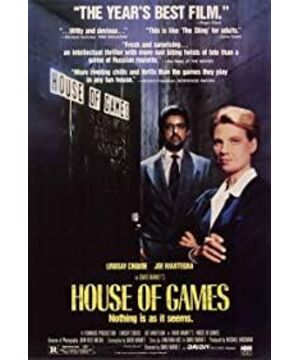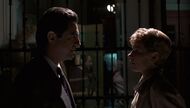At the beginning of the film, the heroine was first recognized by fans to ask for an autograph to explain her background as a successful person; and the diagnosis and treatment of the female patient triggered her motivation for subsequent behavior: trying to change the status quo; accidentally, the boy who went to the doctor later became a compulsory gambler The statement of his identity and his gambling debt provides the heroine with a reasonable way to put her motives into action. Ma Mei's opening design is almost entirely in plot service, it lacks a more in-depth description of the protagonist's character. Although the audience knows that the protagonist is a successful psychiatrist, he did not understand it from the plot or lines sparkling with wisdom, but was forcibly instilled by the director.
Then the heroine went to the "casino" and the problem became more prominent. If the composure when faced with the boy's sudden draw of the gun before, and finally resolving the crisis is a successful portrayal of the heroine’s personality traits, then why is she innocent when faced with the gambling table scam of the thousands of games in the game room? Is it like a female student who has just entered the society? Of course, the audience can understand that different people have different perceptions of social complexity differences caused by industry differences. But obviously the specific profession of psychologists greatly reduces the persuasiveness of this excuse. And then the passages in which the old people demonstrated the envelope deception to her brought the contradictions in this character's character portrayal to the extreme. Please, even if the audience doesn't know how the money was taken at this time, they must know that the envelope is empty. Why would the director think that in the face of such a superficial trick, the audience would be as innocent as her heroine and surprised?
The secret of gambling in bank withdrawals is another plot design in which Ma Mei is self-righteous, but actually belittles the audience's IQ. Why did the cashier that Messi guest starred in the end unsurprisingly to help out? Is it because the director used the actor's mouth to say "You released trust, so he gave back this trust"? Although it must be admitted that in real life, similar tricks do exist. And they are indeed effective under certain circumstances. But the problem is that this is a suspense type movie, not a social documentary. Therefore, the task of the director is not to put on the screen the story of the second-rate swindler who loves the cheap street aunt, but to design plots that are difficult for viewers with the highest IQ and rich movie-watching experience to guess. . To take a step back, even if the director cannot make the already vigilant audience recognize the foolishness of the deceived characters in the film, they should also let them experience the novelty and fun of the plot you designed-such as the Argentine movie "Nine Queens" In the story, two scammers faked their relatives’ car and broke down, and cheated money from an aunt in a certain building.
When I saw the plot of a few people picking up suitcases to cheat money after a date in a hotel, I was really shocked: Ma Mei won't really copy even the old-fashioned tricks in Chinese legal education programs, right? Fortunately, a second twist was added behind him. However, when the woman "timely" saw the deceived person's bathroom call, she still guessed the strangeness. And when she developed the second time she paid for the scammer to avoid disasters, the truth was even more obvious.
This is where the film fails: the audience almost sees the same plot as the heroine, but only the heroine is still in the dark. And this kind of being kept in the dark is fundamentally different from Hitchcock's movies. Greek-style suspense arises because the audience understands it first, but the protagonist does not know it. But this movie is not that the heroine should be kept in the dark, but the director deliberately kept her in the dark.
Before the end, the boy inexplicably came to ask for leave, just in time for the heroine to go out and destroy the evidence (Ma Mei really has no move, and he came up with such a plot to break the game). So she saw something familiar, and suddenly realized... I thought at the time, such a coincidence? Shouldn't this film end up being the joy of David Fincher's "Game" routine, right? If that were the case, it would be really clear and worth looking forward to. But the result... alas.
In fact, the discussion of this film can still be extended to the issue of the relationship between "themes and details" that I am passionate about. Although you can say that the horror and suspense are just a coat, Ma Mei tries to express a certain deep desire of human beings through the bizarre experience of the heroine and the black ending through themes such as the adventure in the game room, and so on. But these ideas can be explained clearly with just a sheet of A4! The real test of the choreographer's strength is the level of knitting of the coat, which does not seem to be important enough.
Speaking of this, I can’t help but think of the concluding remarks of "British watching the new wave" translated a few days ago: Degas once told Manet that he had a lot of ideas, but found it difficult to write poems with pen. The latter responded: "Degas, poems are not written with ideas, but with words and sentences."
I can only say that I don't like the words and sentences Ma Mei used in this film. I don't like it very much.
View more about House of Games reviews









